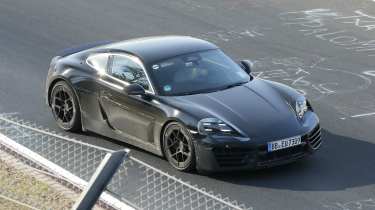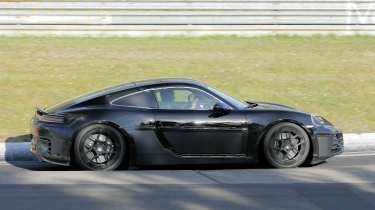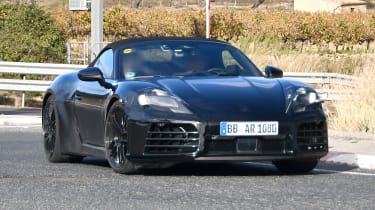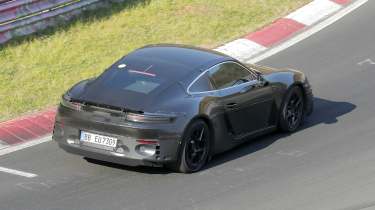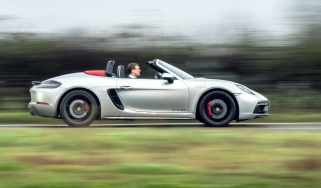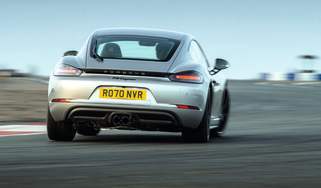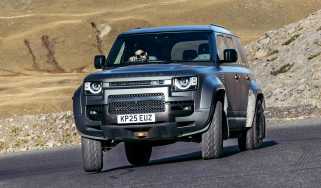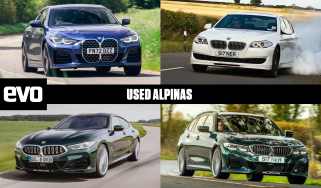Panic over. The Porsche Cayman and Boxster aren’t going electric-only after all
Porsche is developing new combustion-powered 718 models for the end of the decade, but the electric Boxster and Cayman are still in the pipeline
It’s been over half a decade since we first heard whispers of Porsche’s all-electric Cayman and Boxster, and while it’s been confirmed that this project is still in the pipeline, the company has announced a drastic strategy shift away from an electric-only future. A launch is likely still a few years away, but it seems Porsche might just be too heavily invested in this particular project to back down.
Following an announcement during its financial reporting in September, Porsche confirmed it would be postponing the launch of incoming EVs due to a lack of growth in demand and uncertain market conditions. The biggest victim in the product shift is the upsized, 'K1' all-electric SUV that will sits above the Cayenne, which has officially been put on the back burner with internal combustion and plug-in hybrid powered models set to be the only option when the model launches in 2027. Porsche also confirmed it would continue supporting existing EVs like the Taycan and Macan, also listing its ‘future two-door sports car’ as an electric model it would be persisting with.
> Porsche officially puts EV plans on hold, developing new petrol models instead
The announcement offered little in the way of detail, but given that lack of demand for electric vehicles was cited for the strategy change, it’s intriguing that this seems to have remained untouched – demand for an electric sports car is not booming to say the least. To combat this, Porsche has announced the news we all wanted to hear, revealing that it will also produce top-of-the-range, pure-combustion variants to sit alongside the EV – the form these will take and the platform they will be built upon is still under wraps for now.
For now, the latest set of spy shots offer our best look yet at the electric coupe. The overall silhouette and details like the front and rear lighting, appear to borrow at least a little bit from the Porsche Mission R, albeit minus all the race paraphernalia. Don’t be fooled by the 911 ‘side window’ disguise, that’s there to disguise the Cayman’s swollen roofline – the traditional upswept coupe window is just visible under the wrap.
The front lights are clearly in the same style as the Taycan and the Macan Electric, while the rear looks to exchange the existing car’s lozenges for the increasingly ubiquitous light bar. No doubt atop it there will be a movable spoiler element, partially visible in these latest images of the car testing on the Nürburgring. The rear end on these latest images also has curious dents punched in the bumper, which we think are there so the rear parking sensors work without the disguise cladding getting in the way. The real rear bumper should, when revealed, look less dumpy than these prototypes. Perhaps the most dramatic change to these Caymans and Boxsters vs the cars they’ll replace, is the lack of prominent side inlets, with hints of almost vestigial intakes visible behind the door shutlines.
Changes to legislation since development began throw further questions into what world the electric Cayman and Boxster will be silently wading into. Surely a very different one to what was envisaged, back when development first began towards the beginning of the decade. The UK was one of the last holdouts regarding a wholesale combustion vehicle ban in 2030, but that’s now been eased, with low-volume manufacturers exempt and hybrids allowed to be sold by any manufacturer up to 2035. That means, in theory, that an internal combustion-engined Cayman with hybrid assistance and enough (whatever ‘enough’ is) electric range to qualify, could be sold for another ten years.
While Porsche hurriedly focuses on its new range of combustion engined vehicles, development of the electric sports car continues. While extensive cladding on this Cayman prototype makes it difficult to distinguish the fine details, it can’t hide the new EV’s proportions. This is a much broader, stockier car than the relatively slender current Cayman (and Boxster), which at their basis have been in production since 2012. It looks longer and features a 992-style ridged, squared-off bonnet.
Porsche Cayman and Boxster EV power
In terms of output, expect to see around 600bhp in its more potent forms, with the latest Macan EV producing 630bhp in Turbo-spec thanks to a dual-motor setup. Porsche's most extreme current EV, the Taycan Turbo GT, produces 1020bhp and 988lb ft of torque, but given its smaller footprint (and battery) don't expect this level of output from the Cayman/Boxster (at launch, at least).
The Cayman and Boxster’s fundamentals – their two-seat layout, basic silhouette with ‘mid-engined’ proportions and snug, but still practical, interior will remain intact. Specifics about what will be under the skin are still to be revealed, though Porsche CEO Oliver Blume has previously said that they will be based on a new platform developed specifically for two-door sports cars. This will likely be to preserve the ideal driving position flexibility that skateboard architectures don’t allow, as well as give freedom in terms of how much battery capacity is needed and as importantly, where that weight is positioned.
Beyond technical specifics, the question of whether the effort and expense of turning the new 718 into an electric sports car will be worth it ultimately depends on the bottom line.
Electric Porsche Boxster and Cayman: what will their rivals be?
Back in 2022, key Porsche rivals Alpine and Lotus were expected to collaborate Alpine and Lotus were expected to collaborate, twinning an Elise successor with an A110 successor meaning that, with a next-gen electric Cayman, quite the triple test was on the cards.
Now in 2025, that partnership has dissolved but while details on the all-electric Type 135, a replacement for the Emira, are thin on the ground, we’ve recently had insight into how the next A110 is coming along. In an interview with evo, Alpine CEO Philippe Krief confirmed it will have more performance than the outgoing A110, with two motors on the rear axle producing over 400bhp. Given the Cayman is set for a bump in potency, more power for the electric A110 should be no bad thing. A reveal for the electric A110 is due early in 2027, once the current A110 GTS and Ultime runs are through.
> Details on the next-generation all-electric Alpine A110
MG’s Cyberster has received a warm reception, even if the driving experience doesn’t deliver on its looks. On the other hand, there is the Caterham Project V that seems to be moving ahead at pace. As yet, Porsche appears to be persevering with the electrification of one of its core sports car families, with these images giving our latest insight into what’s to come.
Even Mazda is said to be entertaining an electric powertrain option for the next MX-5, even if high-ups have indicated the opposite – that manual, naturally-aspirated combustion-only, with a kerb weight figure under a ton, is the path being prioritised for the ‘NE’ roadster.
> Electric Mazda MX-5 battery details emerge
We also have it on good authority that Toyota is committed to internal combustion for the next Supra and more sports cars besides, potentially including an MR2 and a Celica. Testing is well underway of the new G20E four-cylinder family of engines that sport both increased performance and efficiency, as well as in-built provision for hybridisation.
The hedged bets appear to be the safest at the moment, in a premium and performance market with an unpredictable but generally waning appetite for electric and electrified vehicles.
Meanwhile, sports car demand, while low in relative terms, remains at least consistent. Squeezed between the rock of legislation and the hard place of customer sentiments, it’ll be very interesting to see how this plays out and how an electric Cayman and Boxster are received, by commentators and buyers alike, will surely be the acid test.
